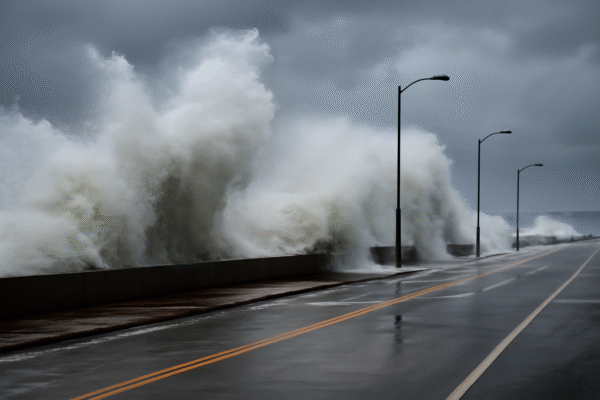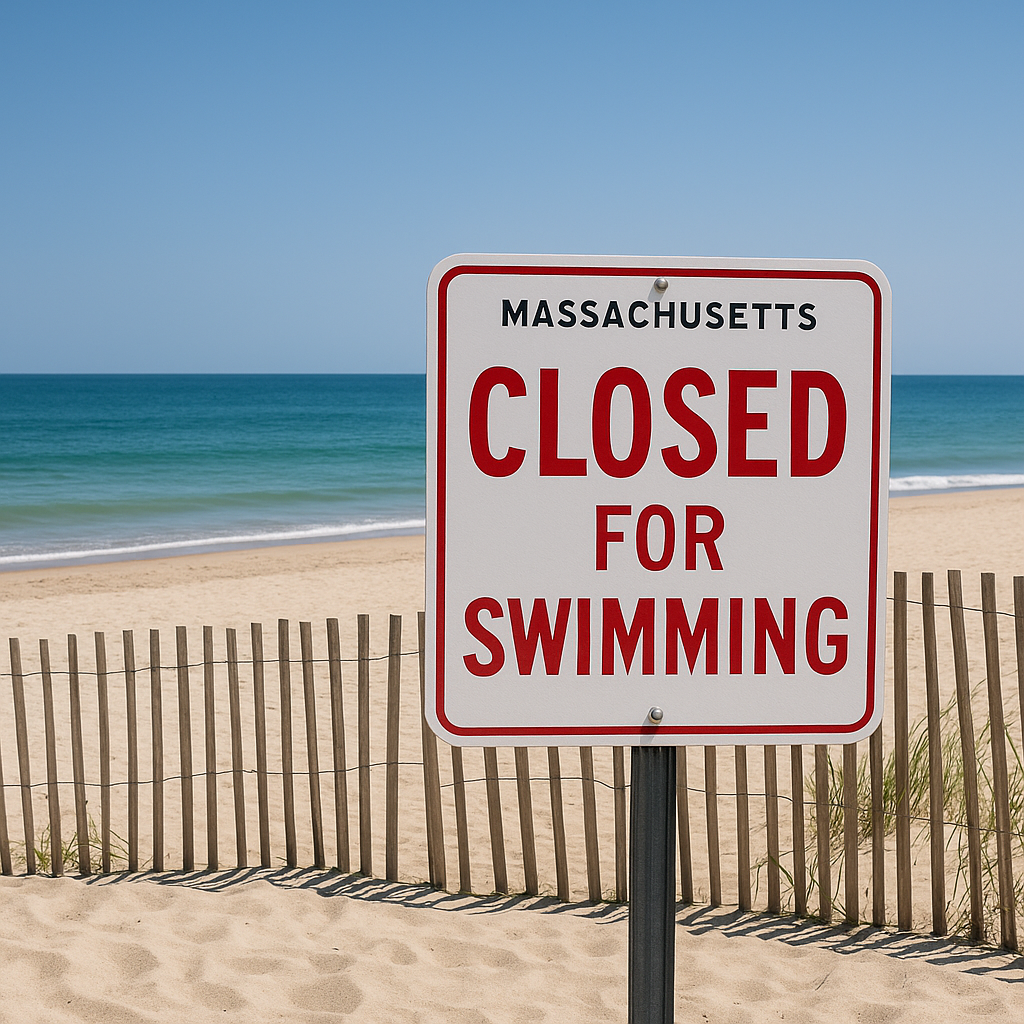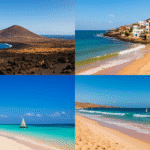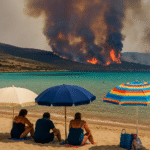As Independence Day approaches, excitement grows for a weekend of sun, sand, and swimming. However, beachgoers across Massachusetts are being urged to double-check the safety status of their favorite spots. The Massachusetts Department of Public Health (DPH) has closed nearly 20 popular beaches due to alarming levels of bacteria and the presence of harmful cyanobacteria blooms. These closures come just days before the busy Fourth of July weekend, raising public concern across the Commonwealth.
Among the affected locations are Pomps Pond in Andover, Mingo Beach in Beverly, Sandy Beach in Danvers, Lulu Pond Beach in Pittsfield, Seth’s Pond in West Tisbury, and Front Beach in Rockport. The closures stem from elevated bacterial counts, potential health hazards, and in some cases, construction projects.
The DPH maintains a real-time beach closure dashboard updated daily. This resource helps residents and tourists verify which beaches are safe for swimming and which pose public health risks.
Why Are Massachusetts Beaches Closing?
The most common reason for beach closures is bacterial exceedance, which often follows heavy rainstorms. Stormwater runoff carries pollutants from roads, farms, and sewer systems directly into nearby lakes and oceans. This runoff can include:
- Animal waste
- Human sewage from overflows
- Fertilizer and pesticide residues
- Trash and organic debris
When these pollutants accumulate in recreational waters, bacteria like E. coli and Enterococci can reach dangerous levels, prompting immediate closures.
Harmful cyanobacteria blooms, known commonly as blue-green algae, also present severe risks. Found at locations such as Upper Mill Pond in Brewster and Cochituate State Park Beach in Natick, these blooms produce toxins that can cause skin irritation, vomiting, diarrhea, respiratory problems, and even death in pets and wildlife.
Complete List of Beach Closures (As of July 2, 2025)
- Pomps Pond, Andover – Bacterial Exceedance
- Mingo Beach, Beverly – Bacterial Exceedance
- Sandy Beach, Danvers – Bacterial Exceedance
- Upper Mill Pond, Brewster – Cyanobacteria Bloom
- Walden Pond (Main Beach), Concord – Construction
- Lulu Pond Beach, Pittsfield – Other Reasons
- Seth’s Pond, West Tisbury – Bacterial Exceedance
- Front Beach, Rockport – Bacterial Exceedance
- Damon Pond Beach, Ashby – Other
- Upper Highland Lake, Goshen – Bacterial Exceedance
- Magnolia Beach, Manchester – Bacterial Exceedance
- Henry F. Collins Beach, Marlboro – Bacterial Exceedance
- Cochituate State Park Beach, Natick – Cyanobacteria Bloom
- Children’s Island (Back & Wally), Salem – Bacterial Exceedance
- Ocean Avenue Beach, Salem – Other
- Peckham Pond at Cape Nihan, Saugus – Bacterial Exceedance
- Beamans Pond, Templeton – Bacterial Exceedance
- Shannon Beach at Upper Mystic, Winchester – Bacterial Exceedance
Health Risks of Swimming in Contaminated Water
According to the Centers for Disease Control and Prevention (CDC) and Massachusetts DPH, swimming in unsafe waters may result in:
- Gastrointestinal Illnesses: Diarrhea, nausea, and vomiting due to ingesting contaminated water
- Respiratory Issues: Wheezing and coughing from aerosolized bacteria or toxins
- Skin Conditions: Rashes, itching, and dermatitis
- Serious Illnesses: Neurological symptoms, liver damage, and exposure-related infections
Pets are particularly vulnerable to blue-green algae toxins. Pet owners should avoid letting animals near visibly discolored or foamy waters.
How to Stay Safe: Use the Beach Closure Dashboard
To minimize health risks and avoid wasted trips, residents and tourists are strongly encouraged to consult the Massachusetts DPH Beach Closure Dashboard. This official site provides:
- Live status updates of beach closures
- Water quality test results
- Maps and closure reasons
- Expected reopening timelines, if available
Health officials also advise checking local signage at beaches and heeding any posted warnings or barriers.
Beach Safety Tips for the July 4th Weekend
If you’re heading out this weekend, keep the following in mind:
- Check water quality online before leaving home.
- Avoid swimming after rainstorms, which increase runoff pollution.
- Look for visual signs of danger, such as green scum or cloudy water.
- Obey all posted warnings, closures, or lifeguard advisories.
- Report concerns to local authorities if you notice unusual water conditions.
Alternative beaches that remain open may offer safer and cleaner environments for celebration. As always, staying vigilant ensures a safe and enjoyable holiday experience.
DPH’s Ongoing Role in Beach Monitoring
The Massachusetts DPH works year-round to safeguard public health at over 500 public beaches statewide. Through routine testing and collaboration with local boards of health, the department ensures rapid response to contamination risks.
In addition to public alerts, the DPH promotes environmental responsibility by urging communities to fix failing septic systems, reduce stormwater runoff, and maintain cleaner recreational spaces.
Final Word: Don’t Let Closures Sink Your Weekend Plans
The Fourth of July is one of Massachusetts’ busiest beach weekends. While closures may disrupt some traditions, real-time information and alternative destinations make it possible to celebrate safely.
Before packing your sunscreen and beach towels, take a minute to visit the DPH beach dashboard. Staying one step ahead helps you make the most of summer while protecting your health and the environment.
For more travel news like this, keep reading Global Travel Wire















